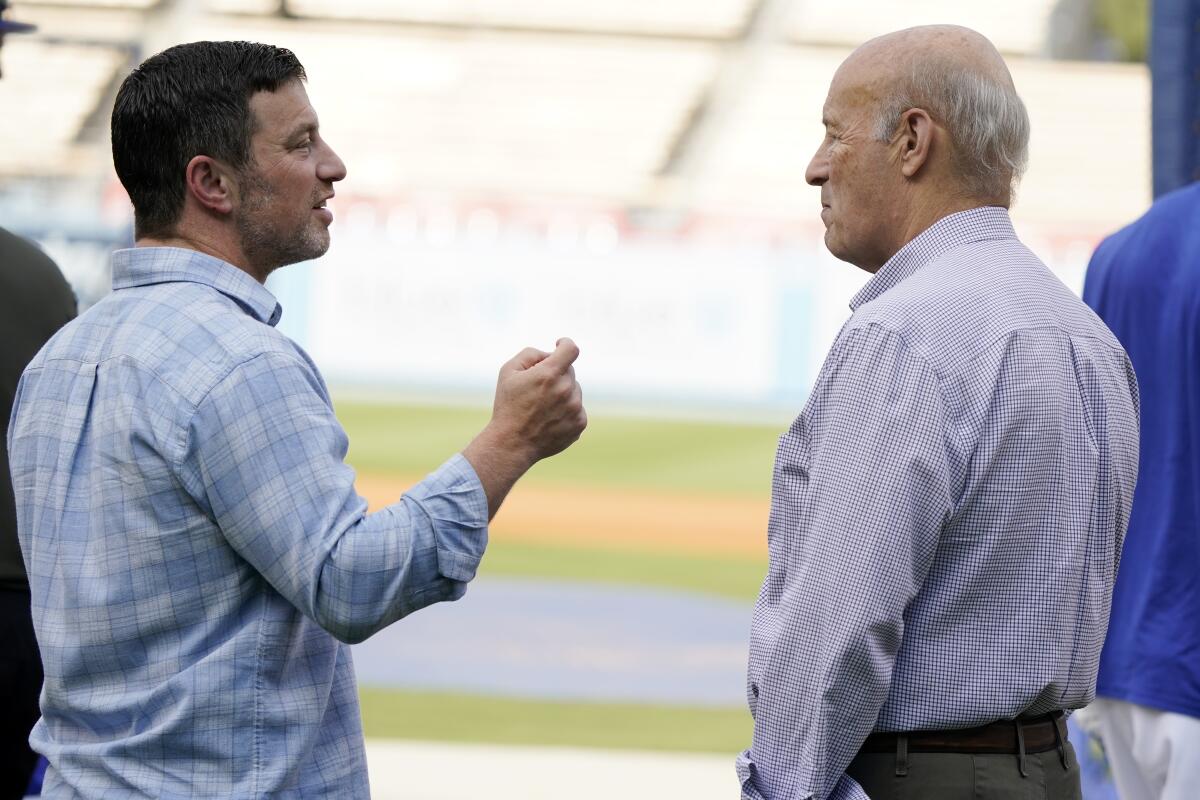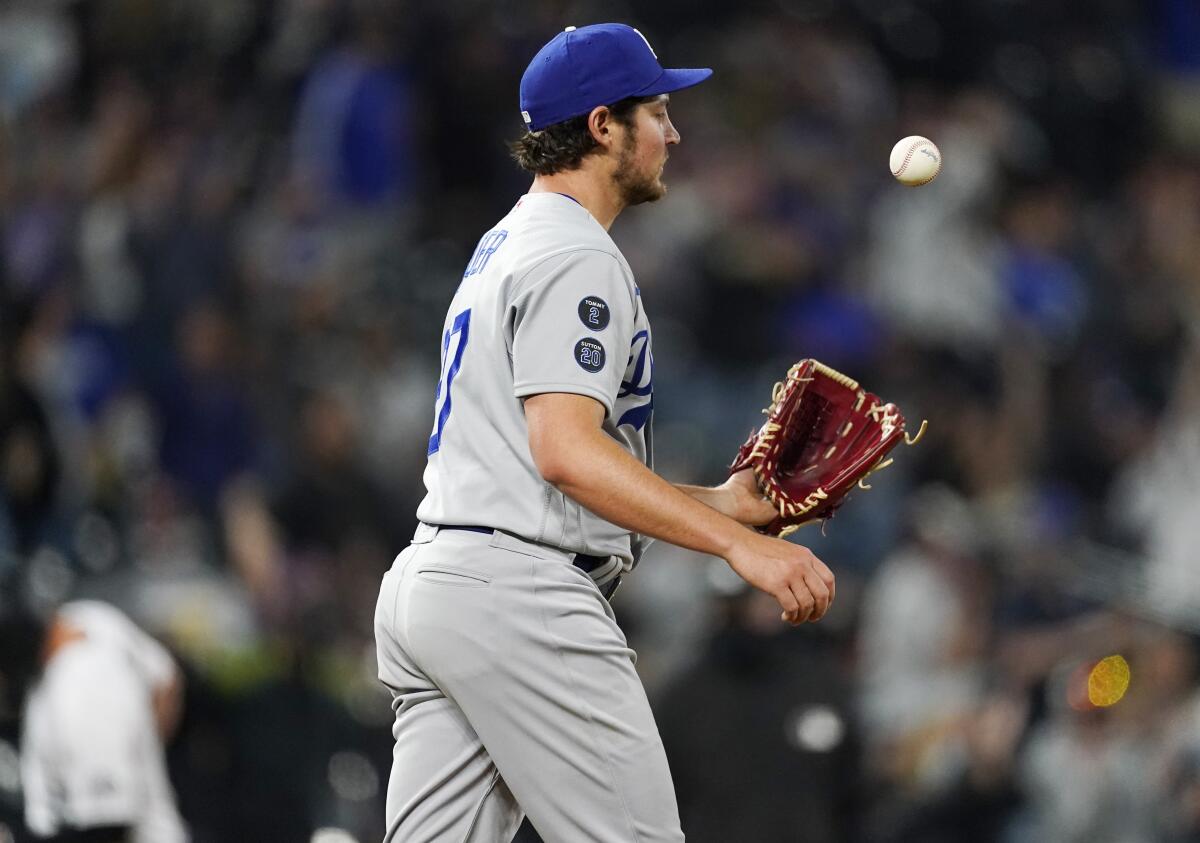Column: Dodgers’ brass still won’t take accountability for Trevor Bauer fiasco

On one side there are the Dodgers, who have a complicated relationship with the truth, and on the other is Trevor Bauer.
They are telling two very different stories about a meeting they both acknowledge took place in Arizona last week, Bauer claiming Dodgers officials told him they wanted him to pitch for them in the upcoming season, and anonymous team officials denying such sentiments were ever conveyed.
Many people in Major League Baseball familiar with both parties don’t know whom to believe, this ambiguity diminishing whatever moral triumph the Dodgers were trying to claim when they officially released Bauer on Thursday.
The Dodgers can only blame themselves.
The Dodgers were unable to trade Trevor Bauer by Thursday’s deadline and he was released. He will find a hostile market in search for a new team.
When Bauer was suspended by the commissioner’s office last year for a violation of MLB’s sexual assault and domestic violence policy, the team released a statement in which it cited his right to appeal and said: “Therefore, we will not comment further until the process is complete.”
Well, the process is now complete and the Dodgers still aren’t commenting; Stan Kasten and Andrew Friedman told The Times they won’t talk about Bauer because he is a free agent. In theory, Bauer could file a grievance against the Dodgers if they made comments that diminished his value.
This, of course, is nonsense, as there is nothing the Dodgers could say that would damage Bauer as much as his record 194-game suspension already has.
Friedman, the team’s president of baseball operations, and Kasten, the team’s president, said they could address the subject if Bauer signs with another team, but that’s unlikely to happen.
And even if Bauer finds a new employer, who knows if Friedman and Kasten would actually talk. They haven’t earned that benefit of the doubt, as they have histories of not owning their mistakes. Transparency is not what they’re about.
Long defined by Jackie Robinson’s courage and Sandy Koufax’s grace, the Dodgers are now a franchise characterized by Kasten’s shamelessness and owner Mark Walter’s cowardice.
The organization’s silence was entirely expected, as the Dodgers have created an upper management culture almost entirely devoid of accountability.
They offered little more than empty platitudes over their scandalous six-year television blackout, blaming everyone but their greedy selves for SportsNet LA’s lack of widespread distribution.
When their team choked again in October, Friedman continued deflecting questions about how they deploy their pitchers, ignoring the mounting evidence that what they’re doing doesn’t work.
The Dodgers aren’t as smart as they think they are but they’re not complete idiots either, and they almost certainly have their reasons for not wanting to revisit their employment and termination of Bauer.

Their courtship of him two years ago was an exercise in hubris, Friedman’s desire to strike an unconventional team-friendly contract overriding the pitcher’s well-known character issues.
Friedman and his lieutenants either screwed up vetting Bauer or didn’t care about what they found. Whichever the case, they have never admitted their error or explained what they have done to ensure they don’t make a similar mistake in the future.
The ending was nearly as problematic. When Bauer’s appeal process was completed and the original 324-game sentence was reduced, why didn’t they release him immediately?
The Dodgers wouldn’t have met with Bauer last week if they weren’t at least open to the possibility of him pitching for them again. How seriously did they consider retaining him? What was Walter’s position? Friedman’s? Kasten’s?
According to Bauer, “Dodgers leadership” said the team wanted him back; is there a team official who is willing to contradict him on the record? If they offered him a chance to return, was it under certain conditions Bauer was unwilling to accept?
When Bauer was designated for assignment last week, the Dodgers said they did so after “careful consideration.” What was there to carefully consider? What did they learn in the meeting that they didn’t already know? Were the Dodgers pressured into letting him go by any outside forces, whether they be season-ticket holders, advocacy groups or sponsors?
How could this winter be categorized as anything other than a disaster when Bauer not only kept them from signing high-end free agents but also from staying under the luxury-tax threshold because of the $22.5 million they have to pay him? Don’t their fans deserve better?
The Dodgers have a reputation for having one of the best front offices in baseball. It’ll be put to the test with $22.5 million owed to Trevor Bauer.
Team officials won’t say. Answering questions would require them to accept a degree of responsibility.
Don’t expect that to change, as Walter, Kasten and Friedman are once again likely to take refuge behind manager Dave Roberts, who had little to do with Bauer’s recruitment but has nonetheless answered the majority of Bauer-related questions over the last two years.
The use of Roberts as a meat shield reveals an obvious lack of character on the parts of his bosses, who don’t seem bothered by how they’re perceived. As Kasten likes to remind reporters, the Dodgers lead baseball in attendance.
Management isn’t holding itself accountable because it knows the public won’t. The Dodgers’ reputation might be damaged but the organization is still making money.
More to Read
Are you a true-blue fan?
Get our Dodgers Dugout newsletter for insights, news and much more.
You may occasionally receive promotional content from the Los Angeles Times.










